A Touch Of Zen (1971)
Directed by: King Hu
Written by: King Hu
Starring: Hsu Feng, Pai Ying, Roy Chiao, Shih Jun
AKA XIA NU, THE LADYNIGHT
TAIWAN
AVAILABLE ON DUAL FORMAT BLU-RAY AND DVD: NOW, from EUREKA ENTERTAINMENT
RUNNING TIME: 180 min
REVIEWED BY: Dr Lenera, Official HCF Critic
Ku Shen-Chai is an unambitious, somewhat clumsy, painter who lives with his mother. One morning, his services are engaged by Ouyang Nin, a traveller behaving in a most suspicious fashion. After investigating what appears to be supernatural activity near his home, Ku discovers that the dilapidated fort next door is now inhabited by Yang Hui-ching, a lovely young woman caring for her aged mother. However, when local officials order him to draw ten copies of a death warrant for Yang, he realizes that the woman he has developed feelings for is wanted by the ruthless Eunuch Wei of the East Chamber, and Ouyang is Wei’s chief henchman….
I remember first watching A Touch Of Zen a couple of decades ago and being blown away by what I saw, though for some reason I never obtained the film afterwards. Too many films and not enough time I guess, though after viewing it again on Eureka Entertainment’s superb Blu-ray, I cannot really understand why I was content not to own a copy. In any case, I’m going to come out and say this: this film is probably one of the greatest martial arts movies ever, even if the actual martial arts isn’t that proficient. And it is definitely, in my view, the best wuxia [a genre of Chinese fiction featuring martial arts heroes with exaggerated powers] picture ever made, and I’m including classics of and variants of the genre such as Crouching Tiger, Hidden Dragon, Once Upon A Time In China, Hero and Zu Warriors Of The Magic Mountain. Even if it comes across as a bit simplistic technically [though that’s not always a bad thing] compared to many of the similar films that followed, there’s something truly magical and awe-inspiring about A Touch Of Zen that raises it just a bit higher, and it even gets away with waiting almost an hour to give us its first action scene, because it’s so fascinating, so cleverly structured, so well filmed, and isn’t really based around its fight scenes – rather, it’s the other way round, with almost an Akira Kurosawa or even a Sergio Leone feel to much of the piece. Yes, Hu takes his time in this three hour movie, but, unless you’re only in the mood for non-stop showdowns, you’ll be very glad that he does.
A Touch Of Zen is based on The Magnanimous Girl, from Strange Stories from a Chinese Studio [Liaozhai Zhiyi], a collection of nearly 500 folk tales written and compiled by Pu Songling. The stories would go on to inspire many later Asian flicks such as the cult classic A Chinese Ghost Story and its sequels, as well as a later Hu work, Painted Skin. Hu was coming off his highly successful Dragon Inn when he decided to make A Touch Of Zen, again for the studio he had set up in Taiwan. However, Hu, who was often prone to taking a long time to make his movies [partly because he was such a perfectionist], took almost three years to make and turn in A Touch Of Zen. A town was constructed just for the film and then allowed to sit there for a lengthy period of time so that it would take on an aged look. White reeds were collected together and planted where scenes were going to be shot during an autumn, but after a month’s shooting there was almost nothing left of them. When model reeds looked poor, Hu made the decision to wait till the summer of the next year to collect and plant more reeds. Hu had virtual carte blanche with this film, but the nervous distributors got him to shoot some extra action scenes to make it more commercial. His original cut was around 400 minutes long, and he refused to shorten it from 180 minutes. Most cinemas showed it in two parts, and in fact filming on part two was still going on when part one was released, but it was still a commercial disaster in Asia. It was, though, invited to Cannes [when being invited to Cannes meant something] in 1975 and got much acclaim internationally.
The first thing that strikes you about A Touch Of Zen is its impressive main title music, with a strong theme passed around between dramatic brass and haunting choir. Unusually for a movie like this, it’s well played and well recorded, and thereafter Hu uses Wu Dajiang’s score throughout rather than pilching bits and pieces from other sources. After the opening credits, Hu nicely sets the stage for the drama to come, firstly by showing us shots of a spider web with different types of prey being trapped and devoured – an apt metaphor for the main narrative of the film involving the Eastern Group’s attempt to trap the last survivor of a renegade family and her allies in its political game – then by giving us lots of gorgeous shots of the Taiwanese countryside and the fort of the story. This is a good example of what I mean when I say that a long running time can be beneficial, at least in the right hands. A shorter film wouldn’t have time for all this preamble, but it’s nice to be given a sense of geography and the environment against where things will play out. Then we are introduced to our hero, slightly goofy scholar Ku, and for a while the film is a mixture of domestic comedy, with lots of amusing banter being exchanged between Ku and his mother, who is unhappy that he’s not married and not interested in a lucrative career as an official, and ghost story, as Ku tries to find out the source of the noises he hears in the fort which is by his house. There’s an extremely drawn out, eerie and suspenseful sequence of Ku investigating in and around the fort where it really does seem that supernatural entities could be about!
There’s no ghost of course – the inhabitants of the fort are the lovely Yang Hui-ching and her own mother, who are in hiding. There’s a tremendous build-up – too long, I suppose, for some, though it’s not as if you can say any of the film is actually boring – as various good guys and various bad guys seem to pop up all over the town, like various pieces on a chess board, and in a manner rather than Hu’s earlier Dragon Inn. The love story, if it can be called that, is unusual, at least for the time. Ku’s mother asks Yang is she will marry her son, but Yang refuses. Later on, Yang invites Ku round, and, after seducing him with music, sleeps with him, an emancipated woman who will not fit into a conventional role but won’t stop herself from having fun. The couple are found by the villainous Ouyang Nin, and he and Yang engage in the first fight of the film, jumping all over the place while the ineffectual Ku just can’t keep up and the teased viewer has to see much of the battle at a distance. Thereafter the action content rarely stops and eventually becomes rather mystical in nature to show us extended fantasies of Zen Buddhism in action, though my favourite battle could be when the outnumbered good guys fake ghostly activity to balance the odds somewhat. I distinctly remember the oddness of the final scenes befuddling me in the wrong way when I first watched the film, especially the emphasis on the main bad guy’s desire for enlightenment. Now, I admire their audacity and the possible multiple interpretations that are possible, though the main idea is clearly the search for peace, a future utopia of harmonious resolution.
Indeed, despite all the fighting, A Touch Of Zen, which is also far less bloodier than most similar films of the time, seems to have an anti-violence message throughout most of its length, something emphasised no more greatly then the startling moment when a seemingly victorious Yu laughs with almost insane glee as he walks around the fort before being jolted into reality by the sight of dead bodies all over the place. The lack of major martial arts expertise doesn’t hold back the fights, which even become weaponless towards the end, from being very exciting [the difference between the quality of the action in Dragon Inn and A Touch Of Zen is striking], and, despite wirework becoming more elaborate in later years and CGI becoming more and more used, it struck me how this kind of thing hasn’t really moved on that much, even if Hu has to rely a great deal on editing in his action scenes. Meanwhile his screenplay is often cleverly constructed, sometimes through lengthy flashbacks [one of them so length that I forgot it was a flashback], though it does have a few glaring flaws, Yu’s transformation from ineffectual oaf to a military general being absurdly sudden, though it’s nicely different that he never engages in any big fights, and it’s not as if there isn’t a slight tongue in cheek nature to some of the proceedings, like when the head monk often seems to appear with the sun shining behind him, transmitting a sense of mock awe.
While I do enjoy the work of many of his contemporaries like Chang Cheh and Lau-Kar Leung, and feel that it’s often overlooked, there’s no doubt that Hu was in a class of his own, at least at the time. A Touch Of Zen is meticulously filmed from beginning to end, and cinematographer Hua Hui-ying’s isn’t afraid to take risks, like filming in near darkness, though his favourite technique is to run alongside the characters. Shih Jun is likeable as Ku, though a bit hammy and his excessive facial paint is jarring. By contrast, Hsu Feng could be the perfect Asian female warrior: ravishingly beautiful, totally lethal, enticingly inscrutable and somewhat tragic. Roy Chaio has what is now my favourite role of his as the head monk, and Sammo Hung turns up as a soldier near the end. A Touch Of Zen is quite a unique experience, especially in its genre, being thoroughly and utterly entertaining, but also containing depth and meaning if you want it. One of those films that I just cannot understand why it’s not better known, it’s a must see for both martial arts movie fans and world cinema lovers alike.
Rating: 









Except for a few shots where the print had lines or damage marks, things that the Taiwanese restoration obviously just couldn’t quite fix, A Touch Of Zen looks magnificent on Eureka’s Blu-ray, full of depth, with the blacks looking especially striking, without losing the thick look that a film from 1970 should have. Aside from a partial commentary, which actually lasts almost 90 minutes, there’s also a fine documentary on Hu which I really enjoyed watching as I knew little about this director, and a nice appraisal of the film. Add to that the extensive linear notes which include The Magnanimous Girl, and you have a fine package which is probably the definitive release of this great movie.
LIMITED EDITION [2000 units] SPECIAL FEATURES:
*New 1080p transfer of the film on Blu-ray, with a progressive encode on the DVD
*Newly translated English subtitles
*Select scene commentary by critic and Asian cinema expert Tony Rayns
*Trailer
*King Hu 1932-1997, a 47-minute documentary on the director featuring interviews with colleagues, collaborators and historians
*Golden Blood, a new video essay by critic and filmmaker David Cairns
*36-page booklet featuring:
– King Hu’s director statement from the Cannes Film Festival
– A 1975 interview with King Hu by Tony Rayns
– The original short story the film is based on
– The eight characteristics of “the swordswoman” in King Hu’s films
– Archival images

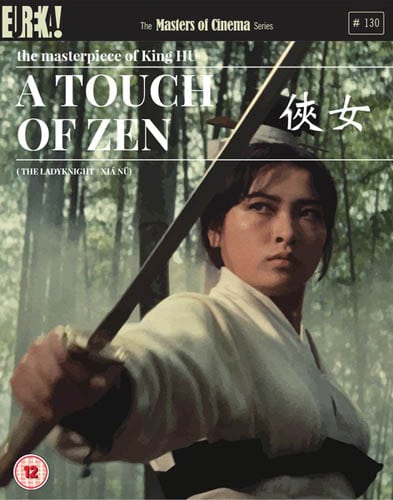
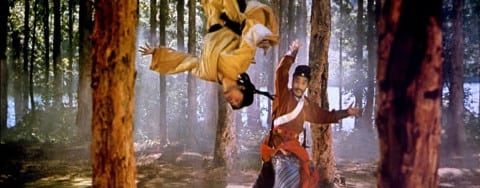
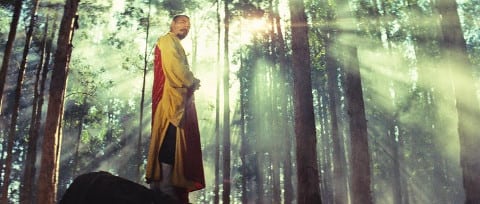

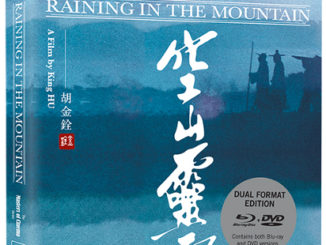
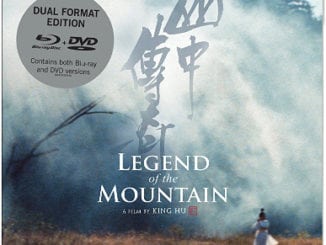
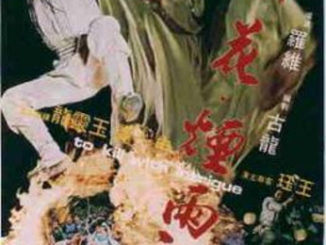
Be the first to comment